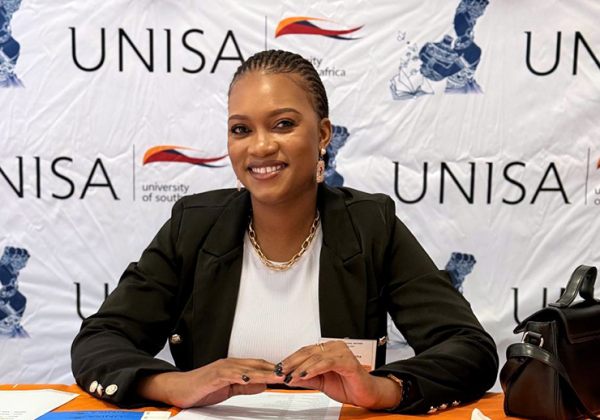
The African college of excellence in the social and human sciences
During this International Women’s Month, the College of Human Sciences celebrates a young woman who, in the midst of darkness, never gave up. Mamoya Letseleha, a junior lecturer in the Department of African Languages, is a true inspiration to young women in South Africa, especially in her home village, Ha-Nchabeng in Qwaqwa.

Mamoya Letseleha, a junior lecturer in the Department of African Languages
At the age of 21, she became pregnant, causing disappointment and shame for her family; however, when her world was falling apart, she reflected on her mistakes and decided to improve her life. She knew that she would regain her dignity in her community if she completed her degree, which would also inspire others to never give up. Letseleha went back to the University of the Free State to complete her BA degree and later completed a BA honours.
Today, she has a Master’s Degree in African Languages from Unisa. Her dissertation is titled "Basotho indigenous plant names: An onomastics study". She says: "My son, Tharollo Karabelo Ndumiso Letseleha, inspired me to further my studies. I wanted him to be proud of me and to know that he was never a mistake that prevented me from reaching my dreams. He is the reason I continue to push forward, something I will keep on doing until God and my ancestors decide that it is enough."
My teachers inspired me – how they shared their knowledge and made education fun sparked my interest in teaching. I also used to teach other learners in class who did not understand the work, which made me realise that I have a passion for teaching.
I had my son when I was 21, during my third year at varsity. It was a bad experience. Imagine a child from a poor background with a struggling parent bringing another child into the world. That is how it was. My mother was so disappointed in me because she saw in me someone who gave up on her hope that things would be different in the future, and in her mind, her struggles would not ease up. Even though I disappointed her, she did not give up on me and my dream of becoming someone. She became a mother to my son when I returned to the university to finish my studies.
It made me more focused because it was not only about me anymore; I had someone I needed to care for. My son was and still is someone I draw my strength from. When I wake up and feel like giving up, I always remember that there is a little human being who looks up to me.
Gaining more knowledge and leaving something behind for future generations motivated me to further my studies. But what motivated me the most was being the first person at home to graduate.
I am very fond of the Basotho’s indigenous knowledge systems. My research topic documents the names of our indigenous plants. This will give future generations more knowledge about these plants and their usefulness in our daily lives. Maybe one day, we will have doctors or scientists who believe in our indigenous plants’ healing properties, and then they will have access to this information to create antidotes that will cure diseases.
I will recommend abstinence as the best option. When you abstain, you avoid contracting sexually transmitted infections and falling pregnant.
My mom, son, teachers, and friends, but mostly, I would like to thank God for this life.
Well, I see myself as the first PhD holder in my family. I see myself as an inspiration to kids from the same background as me. I have learned that every dream is possible if you nurture and nourish it. I would also like to be one of the pioneers of indigenous knowledge systems.
Education is a tool for a better future, a light that inspires change and empowers society.
* By Nnana Martina Jege, Communication and Marketing Specialist, College of Human Sciences
Publish date: 2025-03-17 00:00:00.0